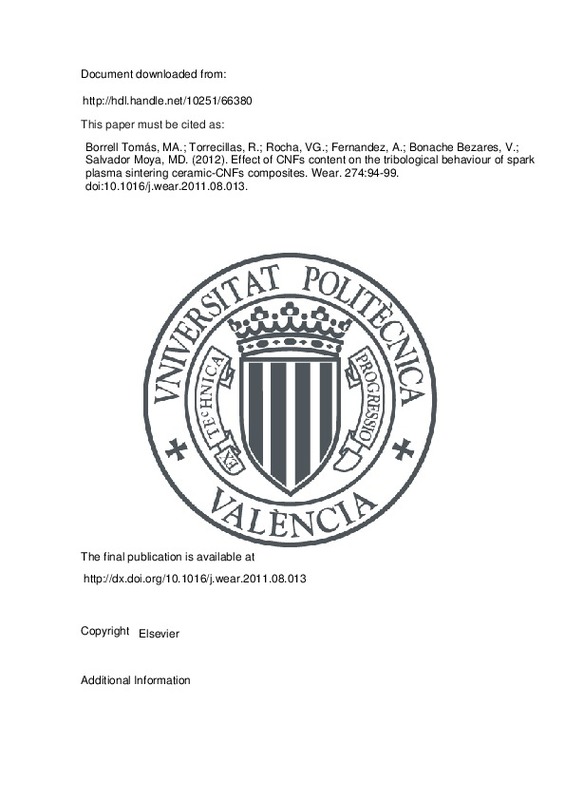Borrell Tomás, MA.; Torrecillas, R.; Rocha, VG.; Fernandez, A.; Bonache Bezares, V.; Salvador Moya, MD. (2012). Effect of CNFs content on the tribological behaviour of spark plasma sintering ceramic-CNFs composites. Wear. 274:94-99. https://doi.org/10.1016/j.wear.2011.08.013
Por favor, use este identificador para citar o enlazar este ítem: http://hdl.handle.net/10251/66380
|
Título:
|
Effect of CNFs content on the tribological behaviour of spark plasma sintering ceramic-CNFs composites
|
|
Autor:
|

 Borrell Tomás, María Amparo
Torrecillas, R.
Rocha, V. G.
Fernandez, A.
Bonache Bezares, Victoria
Borrell Tomás, María Amparo
Torrecillas, R.
Rocha, V. G.
Fernandez, A.
Bonache Bezares, Victoria

 Salvador Moya, Mª Dolores
Salvador Moya, Mª Dolores
|
|
Entidad UPV:
|
Universitat Politècnica de València. Instituto de Tecnología de Materiales - Institut de Tecnologia de Materials
Universitat Politècnica de València. Departamento de Ingeniería Mecánica y de Materiales - Departament d'Enginyeria Mecànica i de Materials
|
|
Fecha difusión:
|
|
|
Resumen:
|
Alumina-carbon nanofibres (CNFs) and silicon carbide-CNFs nanocomposites with different volume fraction of CNFs (0-100vol.%) were obtained by spark plasma sintering. The effect of CNFs content on the tribological behaviour ...[+]
Alumina-carbon nanofibres (CNFs) and silicon carbide-CNFs nanocomposites with different volume fraction of CNFs (0-100vol.%) were obtained by spark plasma sintering. The effect of CNFs content on the tribological behaviour in dry sliding conditions on the ceramic-carbon nanocomposites has been investigated using the ball-on-disk technique against alumina balls. The wear rate of ceramic-CNFs nanocomposites decreases with CNFs increasing content. The friction coefficient of the Al 2O 3/CNFs and SiC/CNFs nanocomposites with high CNFs content was found to be significantly lower compared to monolithic Al 2O 3 and SiC due to the effect of CNFs and unexpectedly slightly lower than CNFs material. The main wear mechanism in the nanocomposite was abrasion of the ceramic and carbon components which act in the interface as a sort of lubricating media. The experimental results demonstrate that the addition of CNFs to the ceramic composites significantly reduces friction coefficient and wear rate, resulting in suitable materials for unlubricated tribological applications. © 2011.
[-]
|
|
Palabras clave:
|
Carbon nanofibres
,
Ceramic-matrix composite
,
Hardness
,
Tribology
,
Wear
,
Alumina balls
,
Ball-on-disk
,
Ceramic composites
,
Dry sliding
,
Friction coefficients
,
Tribological applications
,
Tribological behaviour
,
Wear mechanisms
,
Wear rates
,
Carbon nanofibers
,
Ceramic materials
,
Electric sparks
,
Friction
,
Nanocomposites
,
Silicon carbide
,
Sintered alumina
,
Spark plasma sintering
,
Wear of materials
,
Carbon silicon carbide composites
|
|
Derechos de uso:
|
Reserva de todos los derechos
|
|
Fuente:
|
|
|
DOI:
|
10.1016/j.wear.2011.08.013
|
|
Editorial:
|
Elsevier
|
|
Versión del editor:
|
http://dx.doi.org/10.1016/j.wear.2011.08.013
|
|
Código del Proyecto:
|
info:eu-repo/grantAgreement/MEC//MAT2006-01783/ES/MATERIALES CERAMICOS NANOESTRUCTURADOS TRANSPARENTES PARA APLICACIONES OPTICAS/
info:eu-repo/grantAgreement/MEC//MAT2007-30989-E/ES/CERCANANO/
info:eu-repo/grantAgreement/FICYT//PC07-021/
|
|
Agradecimientos:
|
This work has been carried out with financial support of National Plan Projects MAT2006-01783 and MAT2007-30989-E and the Regional Project FICYT PC07-021. A. Borrell acknowledges the Spanish Ministry of Science and Innovation ...[+]
This work has been carried out with financial support of National Plan Projects MAT2006-01783 and MAT2007-30989-E and the Regional Project FICYT PC07-021. A. Borrell acknowledges the Spanish Ministry of Science and Innovation for her FPI Ph.D. grant. We would like to thank the people from Institute Technological of Materials (ITM) of the Polytechnic University of Valencia for helping us with the tribology experiments during A. Borrell's short stay in 2009.
[-]
|
|
Tipo:
|
Artículo
|







![[Cerrado]](/themes/UPV/images/candado.png)


